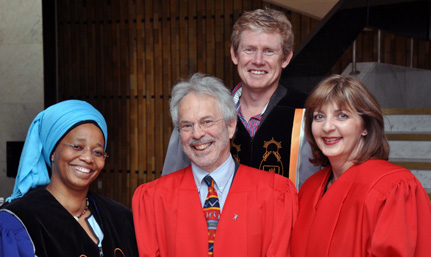Latest News Archive
Please select Category, Year, and then Month to display items
02 January 2018
Photo Destudio Architects and Urban planners
 Architectural illustration of the planned Science Park on the university’s Bloemfontein Campus.
Architectural illustration of the planned Science Park on the university’s Bloemfontein Campus.
Situated next to the Winkie Direko Building on the University of the Free State’s Bloemfontein Campus, an exciting development in the form of a Science Park is on the horizon for the Faculty of Education.
This future development will comprise an outdoor Science Garden and an indoor Science Discovery Centre. It will be characterised by interactive educational displays and exhibitions and will feature an ICT Laboratory, amphitheatre, Family Math and Family Science training facilities, as well as a “planetarium dome simulator”.
The Science Park is in line with the university’s commitment to advance teaching and learning with regard to mathematics and science.
“Since the Science-for-the-Future (S4F) unit from the Faculty of Education focuses on the development of innovative teaching and learning programmes, the envisaged Science Park will support and complement current and future engaged learning initiatives. The Science Park will be a customised teaching and learning environment that embraces and promotes the most effective ways of teaching science, mathematics and technology, through hands-on, interactive, experiential and student-driven educational methods. This will provide opportunities for student teachers from the Faculty of Education, as well as teachers who receive in-service training at the UFS, to enhance the scope of their maths and science pedagogical content knowledge,” said Dr Cobus van Breda, Programme Director of the Science-for-the-Future (S4F) unit in the Faculty of Education.
The Science Park will also serve as a social space on campus where all students can interact within a fun and exciting popular science environment. “We see this as a creative approach to the use of spaces on campus to create an aesthetic and educational added value,” said Prof Loyiso Jita, Dean of the Faculty of Education.
In future, the Science Park, along with the existing synergy between the science and mathematics training programmes based at the Faculty of Education, the Naval Hill Planetarium and the Boyden Observatory, will provide a rich and unique opportunity to experience real-life science as well as content in context; all contributing factors to effective teaching and learning.
The Science Park project is estimated to be completed by the end 2019.
UFS Celebrates Africa Day
2013-05-24
|
 |
|
At the Africa Day Memorial lecture was, in front from left: Dr Choice Makhetha, Vice-Rector: External Relations; Prof Henning Melber and Prof Heidi Hudson, Head of the Centre for Africa Studies. At the back is Prof Lucius Botes, Dean of the Faculty of the Humanities.
Photo: Stephen Collett
24 May 2013 |
Prof Henning Melber: Lecture (pdf)
The University celebrated the 50th anniversary of Africa Day by hosting the annual Africa Day Memorial lecture. Hosted by the Centre for Africa Studies (CAS), celebrations included a day-long colloquium which looked at the continent from various disciplines.
Delivering the Africa Day and also his inaugural lecture, Prof Henning Melber, Extraordinary Professor at CAS, spoke about the mystifying power of ideology and identity with regard to Africa and Africa (n) studies.
Before his lecture, senior professors from different faculties took part in a colloquium, delivering papers on a variety of topics relevant to the continent. In a session on historical-political legacies, Prof Hussein Solomon, Senior Professor in the Department of Political Science, spoke about Critical Terrorism Studies and its implications for Africa. He was joined by Prof Jo van As, Head of the Department of Zoology and Entomology, who spoke about the legacy of colonialism on the conservation of Africa’s river systems. Others topics which were addressed, included the development of sign language, cardiac medicine and science and mathematics education in Africa.